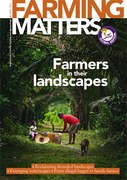Members of the AgriCultures Network are working together to advance family farming and agroecology by drawing lessons from farmers’ fields, sharing knowledge, and working with social movements for policy change. Read our latest news.
A new global agenda for research on family farming
As part of the International Year of Family Farming, research institutions in Montpellier, France held a major conference on family farming and related research in June.
AgriCultures Network representatives from AS-PTA (Brazil), AME Foundation (India) and ILEIA (the Netherlands) participated. More than 200 participants from 70 countries attended, including farmers, development workers, decision makers and researchers. Together, they flagged the need for agricultural research to take ‘a systems approach’. If you change one part of the family farming system (such as by introducing a genetically modified crop), you may affect another part (like disturbing cultural habits related to crop cycles). It also highlighted the fact that many climate smart strategies are actually being developed by farmers, and which could be better integrated into research agendas. Finally, there was a call for more comparative research into the role of family farmers in global versus local food systems, and the effects of both systems on food security.
Participants called upon scientific and political communities to address two structural problems. The first is that a large part of agricultural research is funded by the private sector with little interest in family farmers. The second is the power dimension, i.e. the rich knowledge held by family farmers is often considered of less value than formal science.
Demanding appropriate policies for family farming in Brazil
BrazilWhen the Brazilian government discussed family farming in July 2014, civil society made itself heard. While acknowledging progress in public policy, a number of critical and outstanding issues were brought to the table. The most important were the marginalisation of women and indigenous peoples in public policy, access to land and other resources, as well as the continued threat posed by agribusiness.
Paulo Petersen, director of AS-PTA and vice president of the Brazilian Association of Agroecology, told the assembly that family farming carries qualities that under the right circumstances have the potential to substantially benefit society and tackle many crises that humanity is facing. He urged the Brazilian government to continue to address the factors that most disadvantage family farmers.
Paulo Petersen made the following statement. “The global market treadmill is pushing family farmers off their lands. We must have the political courage to analyse what has been happening over the past 20 years (…): a concentration of wealth and land, increasing indebtedness, environmental degradation, migration of youth, etc. Macro-structural conditions are weakening family farms despite the increasing allocation of public resources to them.” He considers the new Brazilian National Policy for Organic Production and Agroecology, the first in the world, as a resounding victory.But he adds a note of caution.“We must remain critical and should not consider agroecology as an economic sector within agriculture, but rather as a focus for rural development.”
Farm internships in the Netherlands
This year as in 2013, ILEIA is supporting the Farm Experience Internship. More than 20 international students spent several weeks on organic farms in the Netherlands, living and working with the farmers and learning about their day-to-day and long term realities.
A series of presentations and workshops ensured a solid preparation beforehand and thorough reflection afterwards. Students admitted to being very tired after long days harvesting vegetables, pruning trees and carrying boxes. But they said all the pain was more than compensated by the gain, from getting a greater understanding of the many strategic and tactical decisions farmers have to make every day, and from new knowledge about the relationships between plants and insects. They also expressed much satisfaction about eating the food they had just picked from the land.
Following a Brazilian example, the internship brings together farming practice and student theory, and strengthens the connections between farmers, universities and NGOs.
It also facilitates the development of bottom-up research, and introduces interdisciplinary and participatory approaches alongside principles of agroecology.
Photo competition
On 15 September, public voting closed in the International Year of Family Farming photo competition. From more than 1300 entries, a prestigious jury of farmer leaders, artists and activists is now selecting the photos that are considered to most beautifully represent family farmers, pastoralists, indigenous peoples and fisherfolk in action around the world.
The winners will be announced at the end of October in Rome by a representative of the Asian Farmers Association during the Global Dialogue on Family Farming. Winning photos will also feature in a 2015 calendar.
The photo competition is organised by the AgriCultures Network and the World Rural Forum, in close collaboration with the Asian Farmers Association, CLOC- La Via Campesina and the More and Better Network.

